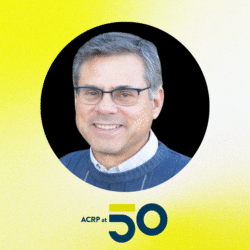You may be well-dressed, surrounded by nice offices and utilizing the latest equipment, but you won’t be a truly effective clinical trial practitioner if you cannot show compassion and earn the trust of your patients, says a man who’s experienced both sides of the relationship.
“Compassion is the foundation of patient-centered care,” Dr. David Zaas, president, Duke Raleigh Hospital told attendees of ACRP’s Southeast Regional Conference in Durham, N.C. last week (October 4). He should know. On February 14, 2017 the otherwise healthy 45-year-old Zaas was stunned to learn he had Acute Myeloid Leukemia. The prognosis was grim.
“Suddenly, I was no longer a physician-scientist,” he said. “I was a patient and I was vulnerable, scared, and worried about the future for my family, not myself.”
It took time and some lucky breaks, but Zaas was able to find a phase I clinical trial at Johns Hopkins where he enrolled immediately. He spent over two months in the hospital, and on May 25, 2017 underwent a haploidentical transplant with his 13-year-old son Jake as the bone marrow donor. He was able to return to work full-time in August 2017. It’s an incredible story with many complications along the way, but Zaas wants to use his narrative to emphasize the importance of compassion in healthcare.
“Compassion is the critical element” in clinical trials and care, Zaas said. He urged clinical trial practitioners at all levels – especially those in leadership roles – to work hard to remember the importance of so-called “soft skills” such as empathy, cheerfulness and respect. Their importance cannot be overstated, he said.
However, effective compassion begins with looking in the mirror, Zaas said. Showing compassion for yourself is vital, and that’s especially true when you make mistakes. Be kind rather than judgmental, he said. “Recognize that failures are shared human experience and take a balanced approach when [you or others] fall short,” Zaas said.
While some lucky souls are born with higher levels of self-compassion that others, the good news is “fostering it can be leaned and enhanced,” Zaas said.
The benefits of self-compassion are legion. It can create a sense of self-worth that improves recovery time after a setback. In addition, it serves as a great motivator for self-improvement and makes a person much more realistic in their self-appraisals, Zaas said.
Leaders should embrace it as a tactic as long as its sincere. “Before people decide what they think of the message, they decide what the think of you,” Zaas noted.
Author: Michael Causey



